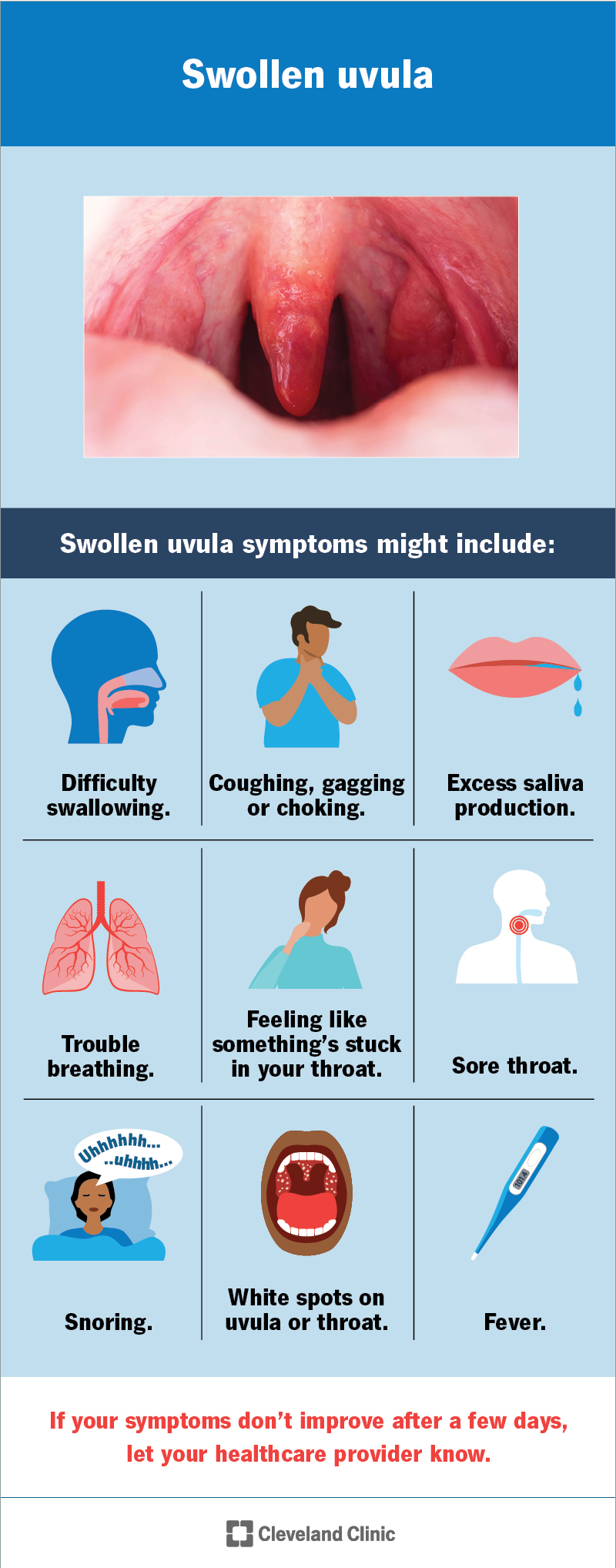Uvulitis is inflammation of your uvula, the fleshy, teardrop-shaped piece of tissue in the back of your throat. Infection, allergies or trauma can cause the condition. Depending on the cause, uvulitis treatments may include antibiotics, antihistamines or, in some cases, surgery.
Advertisement
Cleveland Clinic is a non-profit academic medical center. Advertising on our site helps support our mission. We do not endorse non-Cleveland Clinic products or services. Policy

Image content: This image is available to view online.
View image online (https://my.clevelandclinic.org/-/scassets/Images/org/health/articles/swollen-uvula)
Uvulitis is another word for a swollen uvula. Your uvula is that little fleshy piece of tissue that hangs from the roof of your mouth. It can swell because of things like infections, allergies or trauma. You might develop a swollen uvula when you have inflammation in nearby areas, like your throat or tonsils.
Advertisement
Cleveland Clinic is a non-profit academic medical center. Advertising on our site helps support our mission. We do not endorse non-Cleveland Clinic products or services. Policy
Uvulitis is common. Treating the cause usually eases your symptoms.
Swollen uvula symptoms might include:
Some of the most common swollen uvula causes include:
Advertisement
Uvulitis itself isn’t contagious. But the viruses and bacteria that cause it can spread from person to person.
If you have a contagious infection, be sure to wash your hands frequently and stay home if you have a fever.
A healthcare provider will do a physical exam and ask about your symptoms. They may also request certain tests to see what caused the inflammation. These tests may include:
The quickest way to get rid of a swollen uvula is to treat the underlying cause. To do this, your healthcare provider may recommend:
You may be able to ease mild uvulitis symptoms at home with these remedies:
Uvular swelling often goes away in a couple of days. But if you have severe or lingering symptoms, you should schedule an appointment with your healthcare provider.
You can’t always prevent a swollen uvula. But there are things you can do to reduce your risk:
You should schedule an appointment with your healthcare provider if you have a swollen uvula that doesn’t improve after five days.
If you’re choking or you feel like you can’t breathe, call 911 or head to your nearest emergency room.
If your uvula is swollen, here are some questions you might want to ask your healthcare provider:
Advertisement
Like every morning, you get out of bed. But today is different. Your throat feels sore and scratchy. It’s hard to swallow. You stumble to the bathroom mirror. You open your mouth wide, only to see a swollen uvula in the back of your throat. This can be alarming, especially if you’ve never had uvulitis before. But the good news is that inflammation usually goes away in a couple of days. If you have symptoms that linger or come back often, tell your healthcare provider. They can identify the cause and recommend appropriate treatment.
Advertisement

Sign up for our Health Essentials emails for expert guidance on nutrition, fitness, sleep, skin care and more.
Learn more about the Health Library and our editorial process.
Cleveland Clinic’s health articles are based on evidence-backed information and review by medical professionals to ensure accuracy, reliability and up-to-date clinical standards.
Cleveland Clinic’s health articles are based on evidence-backed information and review by medical professionals to ensure accuracy, reliability and up-to-date clinical standards.
Need care fast? Cleveland Clinic’s Express Care and Urgent Care locations treat everything from sprains to sinus infections — no appointment needed.
